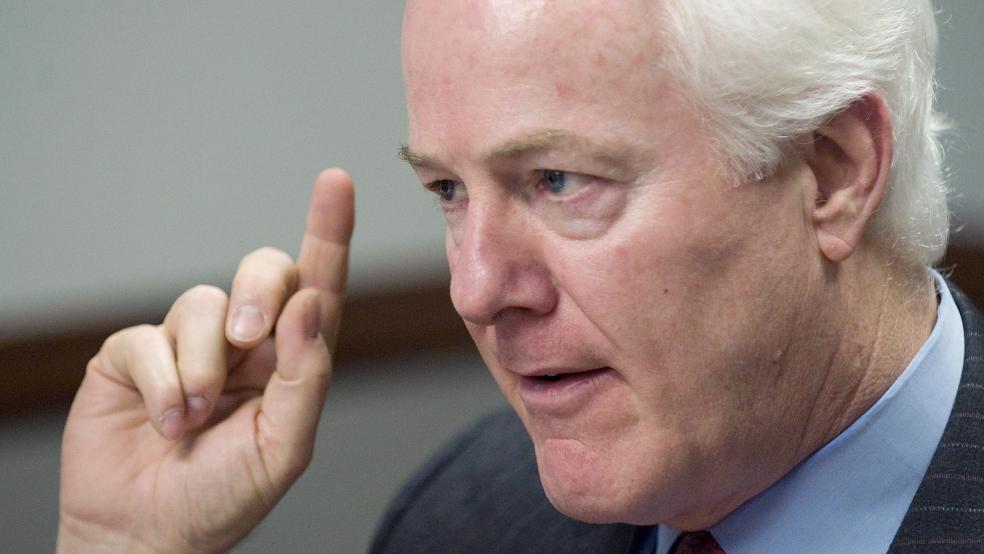With Republicans and the White House deadlocked once again over budget policy for the coming year, the prospects are good for another emergency temporary spending bill this fall or – worse – another partial government shutdown.
The appropriations process has halted, largely because of an impasse over whether to lift spending caps for domestic and defense programs, as President Obama has insisted, or only allow additional spending for defense, as Republican leaders demand. Obama has vowed to veto any of the dozen annual spending bills that reach his desk until the dispute is resolved.
Related: What Balanced Budget? GOP Pushes a 'Spend More' Blueprint
Although the two sides have appeared intransigent in the dispute until now, a top Senate GOP leader disclosed on Tuesday that Republican and Democratic leaders are headed for major budget negotiations in September.
Senate Majority Whip John Cornyn (R-TX) said in an interview today that a new round of budget talks are inevitable and will likely begin shortly after Congress returns from its August recess, barely a month before the deadline for enacting fiscal 2016 spending measures. The talks will also come as the Treasury begins to exhaust its borrowing authority and risks bumping up against the debt ceiling.
“We’re not going to do that until later in September,” Cornyn said following a Senate Republican policy luncheon. “Part of the rationale is they [the Democrats] want to disrupt our ability to actually get anything done now. We’d like to complete what we can now on a bipartisan basis, and then deal with that [budget] issue – which we invariably will – but do that later, after the August recess.”
Congress is rushing to resolve a number of thorny issues, including approving a new multi-year highway and transportation funding bill, before the August recess.
Cornyn’s comment was among the first indication that Congress and the White House may be headed for a comprehensive budget agreement similar to the one negotiated in late 2013 by then-Senate Budget Committee Chair Patty Murray (D-WA) and then-House Budget Committee Chair Paul Ryan (R-WI).
Related: Pentagon’s $90 Billion ‘Slush Fund’ Comes Under Attack
That deal temporarily lifted the spending caps on domestic and defense spending that were imposed by the 2011 Budget Control Act, and overall spending was boosted by $45 billion.
The GOP-controlled House and Senate earlier this year approved a Republican crafted budget blue print for the fiscal year beginning Oct. 1 that boosted defense spending by $38 billion above the caps but preserved tight spending limitations for domestic programs important to President Obama and the Democrats.
Obama called Senate Majority Leader Mitch McConnell (R-KY) last week to confer on legislation, according to McConnell’s chief spokesperson, but it wasn’t clear whether the president pushed for renewed negotiations on the budget. McConnell took charge of the Senate in January vowing to prevent a budget crisis that could lead to another government shutdown.
Related: Out of the Ashes of Budget Politics – A Compromise?
With just 18 legislative days remaining before the end of the fiscal year, Democratic Reps. Chris Van Hollen of Maryland, Nita Lowey of New York and others held a news conference today at the Capitol calling for immediate negotiations on a new budget agreement “that removes the threat of a government shutdown and allows for responsible investments in health care, education, infrastructure, law enforcement, and other critical priorities.” Van Hollen is the ranking Democrat on the House Budget Committee.
Senate Democratic Whip Richard Durbin (D-IL) said in an interview he was unaware of whether the White House and GOP leaders were discussing conducting another mini-budget summit in September, but that “the sooner they do the better.”
“Waiting until the middle of September – and that’s what we’re waiting for – is a guaranteed continuing resolution,” he said, referring to emergency short-term spending authority that continues programs at last year’s levels. “For how long, I don’t know. So the sooner the conversation begins the better.”





